On the Origin of Food Evolution
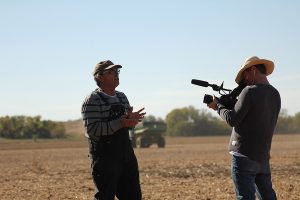
On the farm with Blake Hurst
They say you make a film three times – when you write it, film it and ultimately edit it. And we, the filmmakers, can say with full transparency that Food Evolution turned out to be a different film than the one we first started researching.
But before we get to that, some context. We had partnered up after working on a previous documentary together and were pitching various projects when the Institute of Food Technologists (IFT) contacted us looking for filmmakers to help them bring to life a documentary that would inform a fact-based public dialogue about our food system.
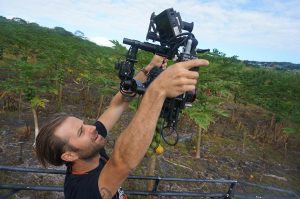
Larkin Donley in the papaya fields
And before our first call, not having heard of this group before, we have to admit that we were inherently skeptical that they were looking for nothing more than advice from a “Hollywood leftie” who was nominated for an Oscar® for a documentary about a community garden in Compton to help them along their way.
So, we did our due diligence and what we found was that IFT is a non-profit, scientific society that publishes peer-reviewed scientific journals and consists of over 17,000 food scientists around the world, spanning across academia, the public sector and the private sector.
Despite not having found any “smoking guns” online or in conversations with experts in food and agriculture, it was the last group, the private sector, that still presented concerns as we set the initial call. But during that first conversation, we learned three important things that would ultimately make it possible for us to make this movie with funding from IFT.
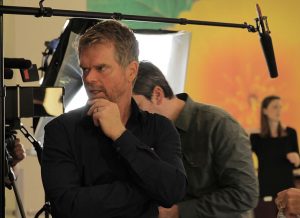
Director Scott Hamilton Kennedy on set
First, as scientists they understood the importance of an independent investigation into a topic as polarizing as the science behind how we grow and produce food, and as such, when we insisted on complete creative control and final cut before we could participate in the project, they willingly granted that control to us.
Second, IFT is not a trade association, they do not represent industry and amongst their members who work in the private sector, many work for the natural and organic food industry as well and not just for what many have come to call “Big Food” or “Big Ag.” They represent science, scientists and the body of scientific knowledge that continues to evolve, as science does. As with nearly all scientific societies, they charge companies that wish to advertise, sponsor or exhibit in their publications or annual food exhibition to help finance their operations as a non-profit. But, most importantly, neither the motivation nor the funding for this film would come from any grants or from any particular company or industry group, but solely from the scientific society itself on behalf of its diverse membership.
And third, as food scientists who were tired of seeing their work denigrated and diminished by less detail-oriented, if often well-intentioned, media and activists that focused on fear-mongering over facts, their overarching goal for this project was to promote a more science-based conversation about food, and not to advance any particular agenda.
From that moment on, we felt total freedom to research ideas for a film on a subject that we, as foodies and filmmakers, were already intrigued by.

Producer Trace Sheehan with Bill Nye
In the beginning, we thought it would be interesting to look at the challenges of feeding a growing population sustainably — from different points of view all along the supply chain — and what role science and technology play in getting food to the table, particularly as it relates to controversial topics like nanotech, irradiation and GMOs, amongst others. And IFT agreed — they heard several pitches and ultimately selected us to take a sweeping look at the food system from soup to nuts, or in this case, from seed to table.
But as we started filming, we quickly realized that, on the one hand, the question of feeding the growing world sustainably is incredibly important and merits a full exploration… But on the other hand, it was clearly much too dense a topic for one feature length documentary and also came with the baggage of being perceived as an “industry frame,” the oversimplified version of which is — “We need more food, thus we need more production, and that’s good for business.”
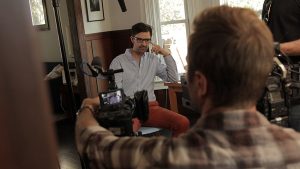
Interviewing Nathanael Johnson
In any case, while filming, we had become more and more intrigued by the ever-present and ever-polarizing debate around GMOs. And it was at this point that we pivoted the story to explore the good, the bad and the ugly of genetic engineering.
IFT was somewhat concerned about this change, because they, as food scientists, did not see genetic engineering, technically considered an agricultural science, as an issue relevant to their members. Essentially, they didn’t want to get involved because they didn’t see it as their fight — “Leave that to the ag scientists.” They were also concerned that the GMO debate was so controversial that it just about burned all who touched it and could become a distraction from the larger conversation they wanted to have about the role of science and technology in food.
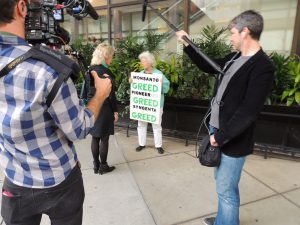
Alison talks to a protester
But, we, as storytellers, showed them, in the words of writer Nathanael Johnson of Grist that “The GMO debate is not about GMOs at all at this point.” GMOs had become a metaphor for almost every issue we have with food and our food system and we wanted to explore if that metaphor had any merit or scientific truth to it. And perhaps, by better understanding the GMO debate, we would be able to make more informed decisions about science and technology in general. No matter the topic.
And that was the film we made — a fully independent investigation into the topic of GMOs every step of the way, interviewing experts on both sides of the aisle and including all points of view. Some say our film is “pro-GMO” but we would counter we are simply “pro-Science” because currently every major scientific institution and all the data and peer-reviewed science tells us, as a process, it is as safe, if not safer, than any other seed breeding technique available.
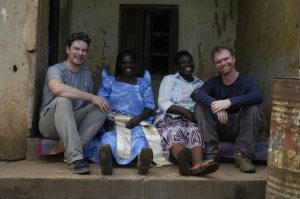
Trace and Scott with Frances & Jemiah
And though there are still important issues with our food and food systems that can and should be better addressed now and in the future, GMOs (shorthand for the process of genetic engineering) are a process that can help make our food system more secure and sustainable in the face of major challenges like climate change, disease (both in terms of plant and human health), and malnutrition, amongst others.
But it is important to remember that each GMO, like most technology, should be examined on a case by case basis. In other words, we need to continue to look at the risks and benefits of each product, particularly with a new look and perspective on those being developed by the public sector for humanitarian ends, without getting stuck on debating the process itself any longer.
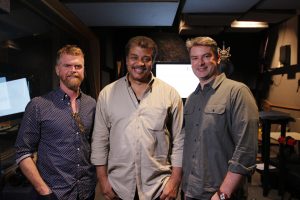
Trace, Neil, and Scott in the studio
And if you don’t agree with the film, no problem. That’s how science works. Show us your data and let the experts and scientists debate the issues in all their glorious nuance. And as we take in the scientific process at work, let’s do our best to put aside bias so we can have more productive conversations and make the most informed decisions we can. That’s all we can ask of each other and ourselves.
-Trace Sheehan and Scott Hamilton Kennedy
